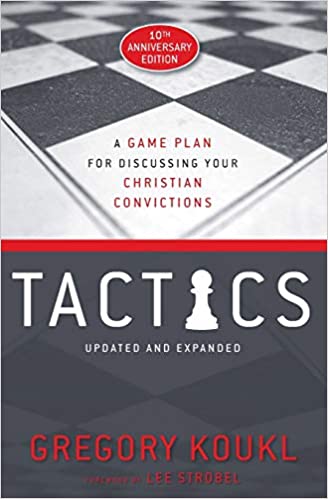A Book Review from Books At a Glance
By Steve West
There are numerous books about apologetics on the market today, but over the last decade Gregory Koukl’s Tactics has continued to make a unique and an important contribution to the field. Although the book contains arguments, it is not merely another catalogue of evidence and reasons that support the Christian faith. The focus of the book is on how to talk with unbelievers in apologetic situations. Koukl provides a simple, clear, and effective map to help Christians feel confident and at ease when they defend the faith. If Christians follow Koukl’s strategies and tips (i.e. tactics), they will also allow the unbeliever to feel respected and listened to, even as the shortcomings in the unbeliever’s objections and positions are revealed. Learning apologetic arguments can increase someone’s knowledge, but studying Tactics is a lesson in practical wisdom.
It is not an exaggeration to say that those who are capable of having a basic conversation about Christ can apply most the tactics in this book with reasonable effectiveness. There are some strategies that require more knowledge and understanding than other ones, but the basic tactics can be used by everyone. Moreover, even seasoned apologists will find that their effectiveness in communicating their views and making their points is increased by applying the lessons in this book. Koukl teaches us how to engage, how to listen, how to identify contradictions, and how to stay in control of the conversation. As simple as it is, the fundamental tactic is to let the other person talk, and we do this by asking them questions. That’s the secret. It’s incredibly simple, but it is also psychologically brilliant. People like to talk, but it is much harder to build a constructive case than it is to identify errors in someone else’s position. The more our conversation partner talks, the less defensive we need to be, and the more the burden of proof falls on their shoulders.
This game plan is not for the purpose of winning debates—it is genuinely designed to help people discover the truth. Most people haven’t thought through their positions with sufficient care, and they cannot support their own worldview. They believe Christianity is intellectually insufficient, but not usually because of real study or engagement. Tactics shows how we can lead people to see the flaws and inconsistencies in their own positions, as well as to see how their objections to Christianity do not succeed. The model that Koukl uses is Columbo, the detective who is famous for unraveling cases and solving crimes by saying, “May I ask you a question?” One of the tremendous benefits of this book is that readers can actually learn a fair number of important apologetic points by paying attention to the questions that Koukl asks.
In terms of an apologetics resource, this one deserves the very rare commendation of being both helpful and one-of-a-kind. Christians who read it as well as a more traditional book of apologetics will find themselves much better equipped for the defense of the faith. As much as we rely on the Holy Spirit, we do require knowledge, and we also are all prone to psychological and social worry. Reading Tactics can help us with the latter; it can make us feel more comfortable and ready for conversations where we are called to defend our faith. It helps make apologetics feel less intimidating, less ivory-tower academic, and more useful for real life. This is a book that is worth reading, worth discussing, and worth putting into practice.
Steve West is lead pastor at Crestwicke Baptist Church in Guelph, Ontario, and Adjunct Professor at Toronto Baptist Seminary.
